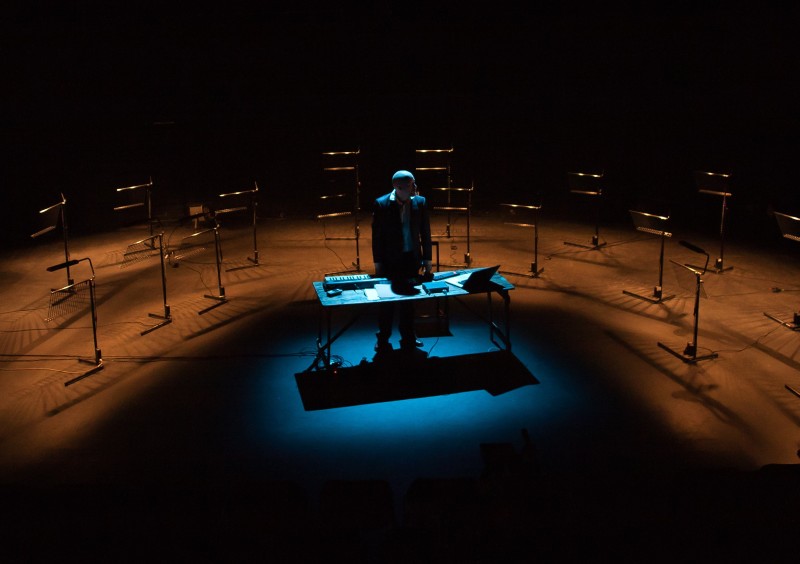 The Bullet and the Bass Trombone is a show about a haunting. A composer stands at the centre of an empty semicircle of music stands. As his story unfolds – and it’s one whose motives and actions feel all too plausible, of postcolonial resentment, civil unrest and murderous realpolitiks – they start to feel like a circle of gravestones. The image is an effective one: without performers or scores (gently stripped by the composer from the stands in the opening sequence) music stands are poignantly redundant, rather undecorative and laced with symbolism, the absence they represent palpable. The stagecraft in evidence in even these opening moments sets the bar high – this image, the simple, powerful actions, and a hugely evocative musical refrain of a whistling bird, whose uncanny calls resemble a neighbour’s cheerful tune, echoing in a distant rainforest.
The Bullet and the Bass Trombone is a show about a haunting. A composer stands at the centre of an empty semicircle of music stands. As his story unfolds – and it’s one whose motives and actions feel all too plausible, of postcolonial resentment, civil unrest and murderous realpolitiks – they start to feel like a circle of gravestones. The image is an effective one: without performers or scores (gently stripped by the composer from the stands in the opening sequence) music stands are poignantly redundant, rather undecorative and laced with symbolism, the absence they represent palpable. The stagecraft in evidence in even these opening moments sets the bar high – this image, the simple, powerful actions, and a hugely evocative musical refrain of a whistling bird, whose uncanny calls resemble a neighbour’s cheerful tune, echoing in a distant rainforest.
Bristol-based two man band Sleepdogs experiment at the edges of theatre, live art and sound work, and it’s no surprise that several of their productions have been adapted for radio. Here they have created a satisfying story to frame a form where sound is the principle actor. A haunted composer (joint company director Timothy X Atack) relays past events that placed the orchestra in peril and for which he feels responsible, having written the music that took them abroad. His medium is various recordings: moments salvaged from damaged mobile phones, and interviews with a couple of the main players after the events. It’s an elegant development of a classic storytelling mode, allowing his voice to work in counterpoint with the recordings as he also mixes soundscapes live from a kitted up sound desk centre stage. Standing where the conductor would have been, this is now his orchestra.
It’s powerful set up and there are scenes (or rather ‘sounds’) of affecting beauty: the bravura sequence of the trumpeter’s tale, trapped alone in a hotel with only her trumpet as a revolution rages around her, rising to a throbbing crescendo soundtrack that mirrors her immersion in the music in which she hides. This section however, like several others, falters for being overlong: the production is perhaps measuring itself by musical rather than dramatic rhythms and this means that the storytelling repeatedly stalls just as it should be revving up.
This is a show with much to say: there is some fascinating commentary in the piece about the ways we use music in our lives, as well as a detailed and utterly believable political narrative, with relevance to too many contemporary conflicts in post-colonial countries around the globe. Atack’s monologues are stuffed with an anguished degree of detail reliving the fear and suffering of his musicians, each lovingly named and remembered in a list like a litany. A rich texture of words and sounds are created, vividly conjuring the contemporary mediated world of distant conflict. But there are missteps too: a narrative twist in the closing sections is a real mistake, threatening to undermine our sympathy for both story and teller and leaving us feeling rather manipulated. There are times when I wonder why director / producer Tanujah Amarasuriya presents this as a live performance, when so much is prerecorded and produced before reaching our ears. The silence and emptiness of that strong stage image seems to offer an answer, but in the closing moments of the play this meaning is discarded, leaving me feeling unsatisfied.
